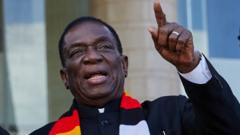In a move to quell imminent protests, Zimbabwe's President Emmerson Mnangagwa has appointed former major general Emmanuel Matutu as the new army chief, following criticism of his leadership amid allegations of mismanagement and corruption. The opposition, particularly from war veterans, is attempting to force his resignation as public scrutiny over his intentions to remain in power escalates.
Zimbabwe's Leadership Shake-Up Amidst Growing Unrest

Zimbabwe's Leadership Shake-Up Amidst Growing Unrest
President Emmerson Mnangagwa appoints a new army chief as protests loom, reflecting deepening discontent among veterans and citizens over his administration.
Zimbabwe's President Emmerson Mnangagwa has recently named a new army chief in a strategic move aimed at quelling rising tensions ahead of planned protests this Monday. The demonstrations are organized by a faction of war veterans seeking to compel the president to resign due to widespread allegations of mismanagement and corruption within his administration.
Emmanuel Matutu, a former major general, has been appointed to assume immediate command of the army. This decision comes on the heels of Mnangagwa's abrupt retirement of the former army chief, Lt Gen Anselem Sanyatwe, who now takes on the role of the Minister of Sports, Arts, and Culture. Known for his reputed ruthlessness, Mnangagwa is colloquially referred to as "The Crocodile," a testament to his controversial rise to power that began with a coup against former president Robert Mugabe in 2017. Currently, he is in his second and final term, which will conclude in 2028.
Growing discontent has surfaced within Mnangagwa’s own ruling Zanu-PF party, particularly after whispers emerged that he might attempt to extend his rule beyond his current term. Despite assurances that he plans to step down in three years, skepticism persists among party loyalists and the public, reminiscent of the turbulent circumstances that led to Mugabe's ousting.
While the level of support from the veterans for the planned protests remains uncertain, the Zimbabwean security minister has issued warnings against participation in these demonstrations. The police have imposed a four-day prohibition in the capital against carrying weapons or any items that could potentially incite violence, indicating the government's heightened alertness to the brewing unrest.
As the situation develops, Zimbabwe remains in a precarious state, with citizens and former allies of Mnangagwa on edge, questioning the president's commitment to democratic governance and the potential for sustained agitation in the public sphere.



















